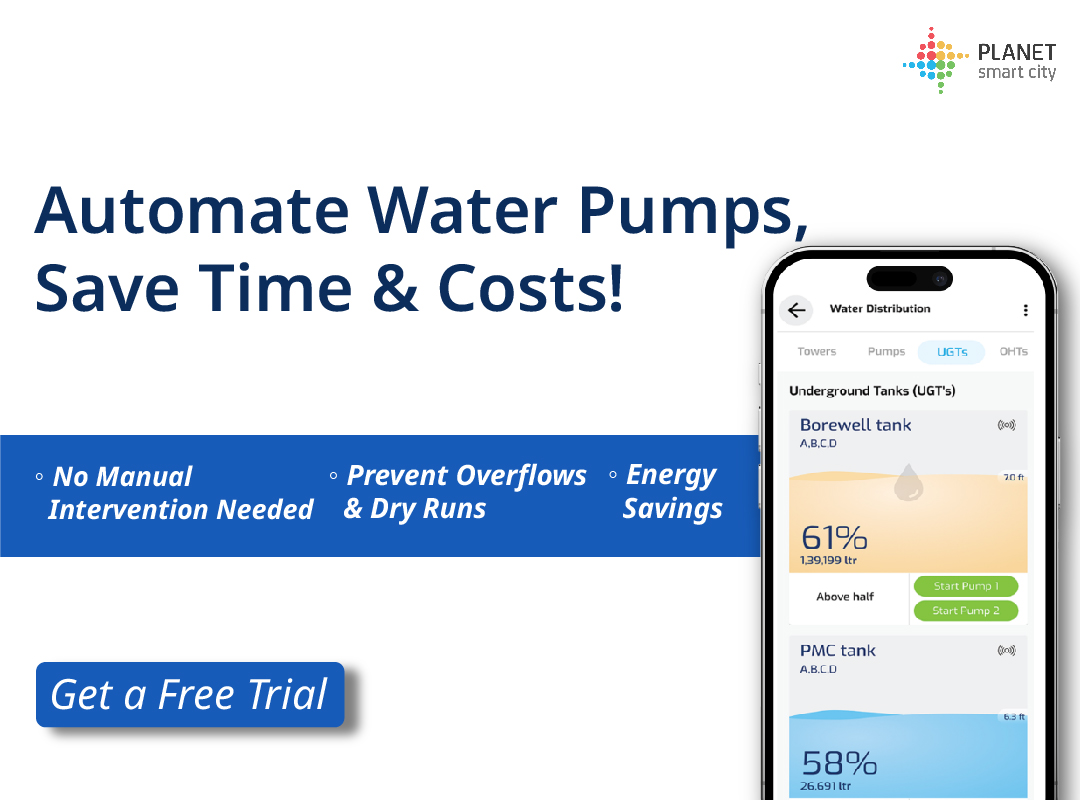Understanding Water Management Systems: Smart and Digital Solutions for Modern Societies

Surviving without water is next to impossible. After all, you use water for everything. Managing this resource effectively is crucial for both urban and rural areas. This is to ensure sustainability and meet the growing demand. Traditional methods of managing water, such as outdated pipeline systems, are becoming less effective as the population grows.
For instance, India loses an estimated 40% of its water to leaks and inefficiencies in traditional water distribution systems, according to a NITI Aayog report. This is where modern water management systems come into play. These systems help us understand and transform how we regulate and utilise water resources.
Hence, it is imperative to explore the significance of water management systems, focusing on the rise of smart and digital solutions shaping the future.
What is a Water Management System?
Let’s start with what is water management system.
A water management system is the collection of processes and infrastructure that allows for regulating, distributing, and conserving water resources. It involves water treatment plants, pipelines, reservoirs, and technology that monitors water usage in homes and industries.
These water management systems aim to ensure water is distributed efficiently and conserved where needed. This is done to support both environmental, health and community needs. Water management systems can include several components, as mentioned below:
- Water source management: Overseeing water extraction from rivers, lakes, or underground aquifers.
- Water distribution networks: Infrastructure that delivers water to homes, businesses, and agricultural fields.
- Wastewater treatment: Processes to treat and purify water after using it, ensuring it can be returned to the environment or reused safely.
- Storage and conservation: Managing reservoirs and other storage systems to ensure a reliable supply during dry periods.
These systems are crucial for preventing water wastage, maintaining water quality, and ensuring access to clean water for all.


Smart City Water Management
The concept of “smart cities” has become more prominent in the context of a rapidly growing world. A smart city uses technology to enhance the quality of life for its residents, streamline city operations, and address the challenges posed by rapid urbanisation.
One of the most critical aspects of a smart city is its water management system. This system must be efficient and capable of handling increased demand while minimising waste.
Smart water management system in cities uses advanced technologies like IoT (Internet of Things), data analytics, and real-time monitoring to optimise the distribution of water.
By implementing smart sensors and automated systems, water usage can be tracked in real time, helping cities reduce waste and improve efficiency. For example, Singapore’s Smart Water Grid uses real-time sensors to detect leaks in pipelines immediately, reducing water loss and costly repairs. These technologies also allow for more accurate water demand forecasting, which helps in better planning and resource allocation.
In smart cities, water management systems are no longer reactive but proactive. They anticipate issues before they become problems, making cities more resilient to water-related challenges like droughts or floods.
Advantages of Water Management Systems
A smart water management system monitors and controls water usage. It also enables data-driven decisions that help reduce waste and lower costs. Let’s dive into the benefits of implementing digital water management, particularly in housing societies and urban infrastructures.
1. Real-Time Monitoring and Data Analytics: One of the primary advantages of smart water management systems is their real-time monitoring of water usage. Using IoT devices and sensors, these systems can track water consumption continuously, sending data to centralised platforms for analysis. This constant flow of information allows for identifying patterns, spikes, or inefficiencies in water use. For example, an unusual rise in water usage could indicate a leak, and immediate action can be taken before too much water is wasted.
2. Cost Savings: Smart systems can significantly reduce operational costs with data-driven insights into water usage. For housing societies, this means more efficient resource use, fewer manual interventions, and reduced reliance on manpower. The ability to automate processes such as water pump operations, water tanker procurement, and lighting control directly results in lower utility bills. For example, Planet SIM, a leading smart society management platform, helped housing societies save up to 15% on monthly utility expenses thanks to its data-driven decision-making.
3. Environmental Sustainability: Smart cities water management systems are inherently designed to promote sustainability. These systems play a vital role in conserving a precious resource by ensuring that water is used more efficiently and by reducing leaks and waste. With automated systems controlling water usage, the environmental impact is minimised, contributing to overall sustainability goals. For instance, Planet SIM’s IoT-powered infrastructure automatically detects and manages water wastage caused by pipe leaks, potentially saving millions of litres of water annually.
4. Increased Operational Efficiency: Human intervention is often required for regular maintenance and monitoring in traditional water management systems. However, smart water management systems automate many tasks, allowing for more efficient and less labour-intensive operations. Tasks such as water pump operation, lighting control, and even tank maintenance can be managed remotely using a smartphone app, reducing the need for physical presence and manual labour. For example, real-time data alerts can notify the management team of any issues, such as low water levels or system malfunctions, allowing them to take immediate action without being on-site.
5. Better Water Quality: Smart water management systems focus not only on the quantity of water but also on the quality. Sensors can monitor parameters such as pH levels, contamination, or temperature, ensuring that the water distributed to residents meets safety standards. This level of monitoring helps maintain a healthy environment and prevents the distribution of polluted water. For housing societies using Planet SIM, the platform’s real-time monitoring capabilities ensure that water quality is consistently checked and immediate action is taken if the water supply is compromised in any way. This offers residents peace of mind, knowing their water is safe and clean.
Different Smart Water Management Systems
A smart water management system combines multiple technologies to improve water monitoring and control. Let’s explore its features and digital transformation.
At the heart of smart water management systems is the IoT. IoT sensors allow smart systems to gather real-time data on water usage, temperature, flow rates, and even water quality. These sensors are installed throughout the water network and can communicate information instantly, allowing for rapid adjustments and decision-making.
For example, smart meters can detect high water usage or abnormal consumption patterns, signalling potential leaks or inefficiencies. Additionally, these sensors can transmit data on water quality, ensuring that treatment processes are optimised and any contamination is caught early.
Beyond IoT sensors, digital water management also involves using advanced software, data analytics, and remote monitoring technologies. Software tools help analyse the data collected by sensors, providing actionable insights into system performance. These technologies also allow for predictive maintenance, identifying potential issues before they disrupt service.
Through data analytics, water utilities can better understand usage patterns and make more accurate forecasts, which leads to more efficient water management. This digital transformation makes the water supply system more responsive and adaptable to changing conditions.
How Can Planet Smart City Help?
Planet Smart City, with its advanced technologies and forward-thinking approach, play a pivotal role in improving water management in modern cities. Through their smart water management systems, they offer a comprehensive solution that integrates IoT, real-time data, and digital technologies to ensure a sustainable water future.
Planet SIM, a platform by Planet Smart City, streamlines water management by offering tools that enable cities to monitor water distribution, optimise consumption, and prevent waste. These technologies are specifically designed to enhance the efficiency of urban water systems, ensuring that residents have access to clean water while lowering environmental impact.
The key benefits of using Planet SIM’s smart water management solutions include Real-time water usage tracking, remote monitoring of water networks, predictive analytics for better forecasting, and automated leak detection. By incorporating such smart solutions, cities can move towards a more sustainable and efficient water management system, improving their residents’ overall quality of life.
Water management is critical to modern society, particularly as urban areas grow. Smart water management systems save costs and contribute to environmental sustainability and better water quality. Integrating technologies such as IoT, real-time data, and advanced software tools is essential for building smarter, more resilient cities.
Popular Searches
advantages of IoT based smart water management system | rain water harvesting in society | importance of wastewater treatment | IoT based water management system | how to clean water tank | what is meant by water management | water management challenges | how to prevent wastage of water | tips for energy conservation | measuring electricity | pre-scheduling tanker management system | sustainable water management | problems faced by society




